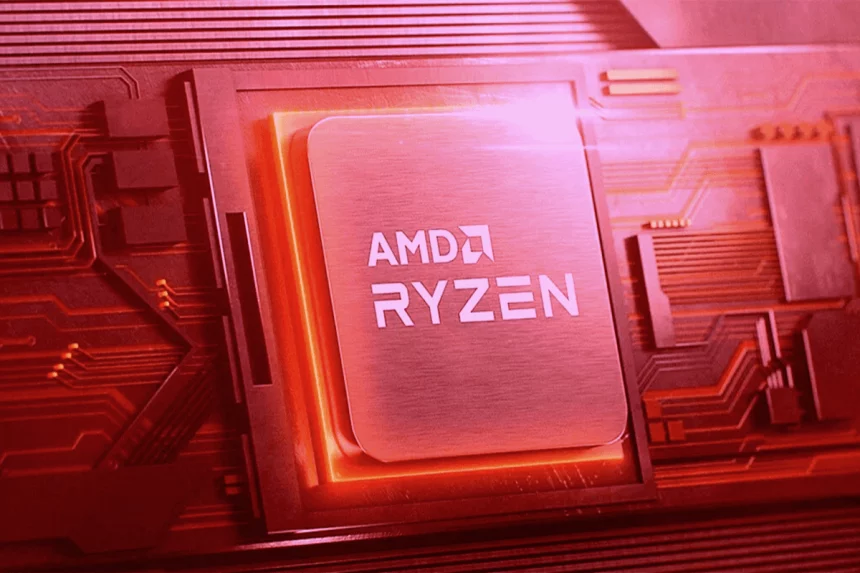AMD has introduced a new labeling system to make it easier for customers to distinguish between laptops powered by different microarchitectures. Laptops featuring the latest Zen 4 microarchitecture (Ryzen 7040/7045 series) will now come with an orange sticker. In contrast, older Zen 2 or Zen 3 microarchitecture-based laptops (Ryzen 7020, 7030, and 7035 series) will have a grey sticker. This system will help customers quickly identify the microarchitecture of the computer they are considering, even if they don’t have access to the technical specifications.
It is important to note that customers interested in purchasing a premium laptop based on the Ryzen 7040/7045 microarchitecture should not rely solely on the orange sticker to make their decision. Additional research is required to ensure that the system is the right fit for their needs. However, if there is any uncertainty regarding the microarchitecture, the orange sticker will provide a quick and easy way to identify it.
AMD’s marketing materials indicate that it’s easy to differentiate laptops featuring the latest Ryzen 7000-series CPUs built on the Zen 4 microarchitecture from those with CPUs based on the Zen 2 or Zen 3 microarchitectures. This differentiation can be made by inspecting the sticker’s color affixed to the laptop. Laptops utilizing the newest Ryzen 7040/7045-series CPUs based on Zen 4 will exhibit an orange sticker, while laptops equipped with previous-generation designs will display a gray sticker.
AMD’s Ryzen 7000-series processor line for notebooks will consist of CPUs based on three different microarchitectures: Zen 2, Zen 3, and the latest Zen 4. This product family will include APUs integrated with GPUs based on three different architectures, namely Vega, RDNA 2, and RDNA 3. The model number of each Ryzen 7000 processor indicates its microarchitecture, but it is unlikely that most customers will remember this information when shopping for a new laptop.
Therefore, AMD has introduced fresh orange Ryzen 7000-series stickers for laptops that contain Zen 4-based Ryzen 7040/7045-series ‘Dragon Range’ and ‘Phoenix’ APUs. Midrange and entry-level laptops will continue to use the existing silver/gray stickers, indicating that the Zen powers them 3-based Ryzen 7030-series ‘Rembrandt’ CPU and may include Zen 3 and RDNA 2 graphics. VideoCardz was the first to report on this development.
ALSO READ: Best Laptop Stickers, Skins and Decals
While the orange Ryzen 7000 sticker may be effective in helping customers identify laptops with the latest AMD technology, a significant number of consumers rely on online purchasing rather than retail stores, which can complicate the identification process. Some online vendors may need to provide accurate information about their products, but many consumers still prioritize the model number’s first digit when purchasing laptops.
Despite the potential confusion for customers, original equipment manufacturers (OEMs) tend to introduce new product families rather than continue using older ones, even if they contain rebranded previous-generation processors. This practice is common among AMD and Intel, who sometimes include older silicon in new product lineups with new model numbers. This approach can create challenges for consumers who need help distinguishing between new and old products within the same product family.
Additionally, the new orange stickers will be used exclusively for laptops based on the Zen 4 microarchitecture, expected to deliver significant performance improvements over the previous Zen 3 architecture. The Zen 4-based Ryzen 7000-series processors will likely offer improved power efficiency and support for new technologies such as DDR5 memory and PCIe 5.0.
It’s worth noting that stickers to differentiate between different generations of processors within the same product family are expected in the tech industry. Intel, for example, has used a similar approach in the past, with different stickers denoting different generations of its Core processors. Overall, the introduction of the new orange stickers for Zen 4-based Ryzen 7000-series laptops is a welcome move by AMD, as it will make it easier for customers to identify the specific microarchitecture of a laptop considering, especially if they don’t have access to the technical specifications.


